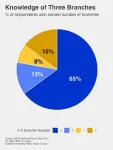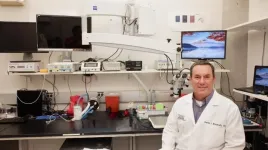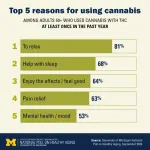(Press-News.org) Highlights:
Diastatic yeasts can spoil craft beer through hyperattenuation, which boosts the alcohol content and causes bottles to explode.
Killer toxins, which are produced by other yeast strains, hint at a remedy.
In a proof-of-concept study, researchers found that killer toxins inhibited up to 95% of diastatic yeasts.
More work is needed to fine tune the recipe, but killer yeasts may help brewers remedy potentially contaminated beers.
Washington, D.C. — Sept. 12, 2024 — When diastatic strains of Saccharomyces cerevisiae, or brewer’s yeast, land in the wrong place, they can become a craft beer brewer’s nightmare. Diastatic yeasts are variant strains of yeasts that secrete glucoamylase, an enzyme that can break down dextrins into simple sugars, which can spoil fresh beer by augmenting the alcohol content, changing the flavor and in worst-case scenarios, making bottles explode.
One way to remedy the problem before bottles start to break might be hiding in plain sight. This week in Applied and Environmental Microbiology, a group of brewers and microbiologists report the solution to this yeast problem may be other yeasts. The researchers found that proteins called killer toxins, which are produced naturally by many strains of S. cerevisiae, suppress diastatic strains and may help curb the issue.
“If you’ve got a diastatic contamination, most of the time you just throw away the beer, and that’s expensive,” said microbiologist and senior author Paul Rowley, Ph.D., at the University of Idaho. “What we show in the paper is that we can add the killer yeast at the point of contamination. It’s a remediation procedure to prevent the diastatic strains from taking off.”
Diastatic strains of S. cerevisiae play an important role in brewing Belgian-style saison beers, which typically have a higher alcohol content than other styles. The problem arises, Rowley said, when those strains end up in the mix for pale ales and other types and set off a secondary fermentation. Although many breweries have robust surveillance methods to prevent contamination, the strains can slip by.
“If you were to look at these strains on an agar plate, you couldn’t morphologically tell the difference,” he said. The only difference, he said, is that diastatic yeasts have a genetic change that gives them an extra ability to degrade residual starches. “Yeast looks like yeast.”
Large breweries avoid the problem by pasteurizing beer, but the process is expensive, and some small brewers worry that pasteurization changes the taste, said Nicholas Ketchum, a microbiologist who works at the Rhinegeist brewery in Cincinnati, Ohio and co-author on the new study. One of his responsibilities at Rhinegeist is to keep an eye out for diastatic contamination.
The research began a few years ago when Ketchum was teaching an applied microbiology and brewing class at a community college in Cincinnati. As he prepared a lecture on wild yeasts and killer toxins, he realized that those proteins might offer an inexpensive way to remedy diastatic contamination. He ran a few experiments, presented preliminary findings at the World Brewing Congress in 2020, and discussed the work on a beer brewer’s podcast—where the mention of killer yeasts caught Rowley’s attention.
Researchers in Rowley’s lab—including then-undergraduates Victor Zhong and Ximena Garcia—subjected 34 diastatic strains of yeast to Saccharomyces strains producing 8 known killer toxins. The most effective toxin, K1, prevented the growth of more than 91% of diastatic strains tested.
The next step is to better understand the mechanism, said Ketchum, and find a way to make it broadly useful to craft brewers. “There are more unknowns than there are knowns” about the process, he said. The efficacy of the toxins, for example, seems to depend on the amount of total yeast in the mix, and not just diastatic strains. Rowley is also currently investigating how widespread the problem is among small brewers.
Rowley continues to investigate killer toxins, which haven’t been well studied. “Yeasts are a lot more complicated than we might think,” he said.
###
The American Society for Microbiology is one of the largest professional societies dedicated to the life sciences and is composed of over 32,000 scientists and health practitioners. ASM's mission is to promote and advance the microbial sciences.
ASM advances the microbial sciences through conferences, publications, certifications, educational opportunities and advocacy efforts. It enhances laboratory capacity around the globe through training and resources. It provides a network for scientists in academia, industry and clinical settings. Additionally, ASM promotes a deeper understanding of the microbial sciences to diverse audiences.
END
DALLAS, September 12, 2024 — The American Heart Association, celebrating 100 years of lifesaving service in 2024, is recognizing 21 students, educators and elementary, middle and high schools from across the country who are making a bold impact in the battle against cardiovascular disease – the nation’s leading cause of death. These exceptional individuals and institutions were honored for their unwavering commitment to the Association’s in-school programs, Kids Heart Challenge™ ...
A new study has revealed for the first time how different synthesis methods can profoundly impact the structural and functional properties of high entropy oxides, a class of materials with applications in everyday electronic devices. The study was published this week in the Journal of the American Chemical Society.
“The specific material that we’ve studied here is a high entropy oxide with a spinel crystal structure, which is a mixture of five different transition metal oxides. A lot of the excitement that we ...
Less than half of Americans can name most of the rights protected under the First Amendment and under two-thirds can name the three branches of government, according to the Annenberg Constitution Day Civics Survey, released annually since 2014.
The Annenberg Public Policy Center’s nationally representative survey, conducted in May 2024 with about 1,600 U.S. adults, finds levels of public knowledge largely unchanged from 2023. As was true last year, most Americans could name only a single right guaranteed by the First Amendment: freedom of speech, provided by nearly 3 in 4 respondents.
The survey also found strong public support for ...
NEW YORK, September 12, 2024 – For the second time, the Blavatnik Family Foundation and The New York Academy of Sciences named three women scientists as Laureates of the Blavatnik National Awards for Young Scientists. Each will receive $250,000, the largest unrestricted scientific prize offered to America’s most promising, faculty-level scientific researchers under 42. Three independent juries – one each for life sciences, chemical sciences, and physical sciences & engineering – composed of some of America’s most distinguished scientists selected the three winning Laureates. An additional 15 Finalists will each receive ...
After more than a decade of research growth and recruiting efforts to build strong, collaborative research programs, the Jerry H. Hodge School of Pharmacy in Amarillo has developed the Brain Drug Discovery Center, the newest Texas Tech University Health Sciences Center (TTUHSC) research center.
Created from two existing pharmacy school centers — the Center for Blood-Brain Barrier Research and the Cancer Biology Research Center — the Brain Drug Discovery Center will focus on ...
A QB3-led team uniting researchers from the University of California campuses at Berkeley, San Francisco, and Santa Cruz was awarded a $12 million grant from the California Institute for Regenerative Medicine (CIRM) to investigate the origins of autism using sophisticated cellular models called “neural organoids.”
This grant is the first funding brought in by QB3’s Collaborative Research initiative, which was recently created to address major challenges in human health by leveraging research talent and resources across the UC campuses served by QB3.
"We are grateful for the support provided by the CIRM team to craft a highly successful application ...
Whether they’re using it for recreational or medical reasons, a sizable percentage of people in their 50s and older have smoked, eaten, drunk or applied to their skin at least one form of cannabis in the past year, a new poll shows.
In all, 21% of people age 50 and older said they used a form of cannabis that contains the psychoactive compound THC at least once in the past year, according to new findings from the University of Michigan National Poll on Healthy Aging. The poll report focuses on use of cannabis ...
Mill Valley, CA – September 12, 2024 – The SynGAP Research Fund 501(c)(3) announces a $128,888 grant to Dr. Baptiste Lacoste at the uOttawa Brain and Mind Research Institute (uOBMRI) and Ottawa Hospital Research Institute (OHRI). This grant supports Dr. Lacoste's pioneering research project aimed at exploring the role of vascular and metabolic dysfunction in SYNGAP1-Related Non-Syndromic Intellectual Disability (SYNGAP1-NSID), also known as SYNGAP1-Related Disorders (SRD).
With elevated energy demands and a limited capacity to store ...
A Scottish $75,000 prize for “radical innovation” has shortlisted four academics from around the world.
Named after Panmure House, the former Edinburgh home of 18th century Scots economist and philosopher Adam Smith, the Panmure House Prize rewards groundbreaking research that contributes to advancing long-term thinking and innovation.
After a record number of entries for the 2024 prize, its fourth year, the judges have drawn up a shortlist of four submissions from the United States, Spain ...
Boston, MA and Rolle, Switzerland, September 12, 2024 – SOPHiA GENETICS (Nasdaq: SOPH), a cloud-native healthcare technology company and a global leader in data-driven medicine, will be presenting multiple posters at the European Society for Medical Oncology (ESMO) Congress 2024 being held in Barcelona, Spain September 13-17, 2024. The ESMO Congress is a globally influential oncology platform for clinicians, researchers, patient advocates, journalists and healthcare industry representatives from all over the world.
The details of the presentations are as follows:
Title: ...







